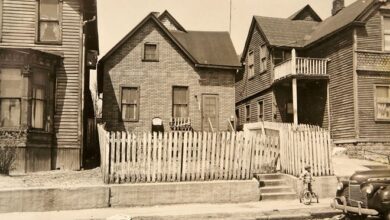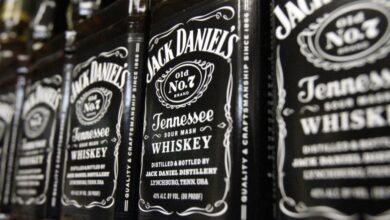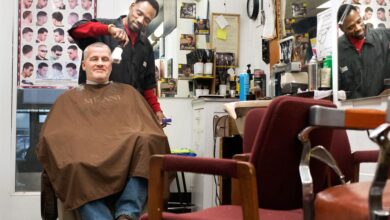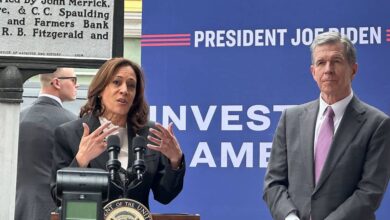Business owner Rupert forged his own path when others told him no

Terry Rupert on being Black in Lincoln.
Terry Rupert had already established himself as a Lincoln businessman. The success of Grandpa’s Ribs and Secret Sauce and multiple convenience stores testified to that.
So, he was taken aback when he couldn’t buy a house he wanted in the Clinton neighborhood.
It wasn’t because of a bad credit score or a lack of money.
“The white owner looked at me,” recalled Rupert, “and said, ‘I’ll never sell it to you because you’re Black.’”
Rupert has never been fond of being told no. So, he asked a good friend, a white businessman, to make an offer on the house. His offer was immediately accepted, and Rupert then bought the house from him.
Such determination and smarts characterize the man, says Rupert’s longtime friend William Brian.
People are also reading…
“If one door closed, he just kept knocking on doors until someone would let him in, and once he got in, he was there to stay.”
The sun blazes down on 9-year-old Rupert as he flies up and back on a squeaking swing. It’s another day at the park near his home in North Omaha’s Spencer projects. Kids bantering, swinging, yelling, doing what kids do at a park.
Suddenly, a gunshot rings out. Rupert and his friends hit the ground, as they normally do when they hear gunshots. Startled and alarmed, he rushes toward the sound of the shot.
A block over he joins his neighbors staring at a young man on the ground. Rupert’s ears are ringing, his eyes fixed on the young man wailing just a few feet away, blood bursting from his wound. As mothers sob in disbelief and red, white and blue lights race through the neighborhood, Rupert is paralyzed.
This wasn’t the first gruesome event Rupert had witnessed in the projects. These recurring incidents became lessons of a sort.
“You either got beat up or beat up someone,” says Rupert.
He came to believe it was best to follow the crowd; there really wasn’t a choice.
It often landed him in trouble. In 1973, when Rupert was 14, trouble finally threatened big consequences.
Arrested with friends in a stolen car, he was soon facing Judge Elizabeth Davis Pittman in Omaha Municipal Court. Judge Pittman, one of only 39 Black female judges in the country, didn’t mince words. She warned Rupert that if his trajectory didn’t change, he was headed to Boys Town.
Six months after the warning, with much encouragement from his older sister, Nelda, Rupert’s mother packed up and moved the family to Lincoln. A more stable atmosphere, they hoped, would keep Rupert out of trouble.
“I thank God that my sister told my mother to get me out of there,” says Rupert.
Their new neighborhood, near 23rd and Y streets, was nothing like the Spencer projects. In Lincoln, Rupert’s everyday life drastically changed, and so did his trajectory.
“I just told my mother, ‘It worries you too much and I’m just not going to get in any trouble anymore.’”
While his family could never afford a car, he was fascinated by them. So, at Lincoln High, an automotive class and long hours building motors and putting transmissions together nurtured a budding work ethic. That also led to lots of fun.
Most Fridays, Rupert and his friends, who were fondly known as gearheads, would gather near 84th and O streets to race their cars. They’d go from 9 p.m. till 2 in the morning, with spectators chanting and the smell of burnt rubber filling the air.
Sometimes police would show up and hand out tickets, but they were no match for the 200 or so spectators and racers.
After graduating from Lincoln High and completing two semesters at Southeast Community College in auto body and welding, Rupert took his skills to Kawasaki.
He began by putting wheels on motorcycles, then moved on to painting the bikes. He became one of the fastest painters on the team.
Seven years later, Rupert applied for a supervisor position. Kawasaki didn’t believe he was qualified. After speaking with his boss, who told Rupert he really needed him as a painter, Rupert knew he’d gone as far as he could.
“I decided I needed to be my own man and if I ever was going to make it in this life, I had to hold my own because Lincoln, Nebraska, was never going to let me succeed under somebody else,” says Rupert.
While still clocking 10-hour shifts, Rupert began to plan his own business. In 1983, he left Kawasaki and opened his restaurant and food truck, Grandpa’s Ribs and Secret Sauce. Finally, he was his own boss.
Tutored by his mother, Rupert had been cooking since he was 5 years old. So, with his kitchen skills and few barbecue businesses in Lincoln, a restaurant seemed a perfect starting point.
People liked what he cooked and soon his little shack on 23rd and Holdrege drew crowds. A few years later, wanting more space and unable to get a liquor license in Lincoln, Rupert decided to open another Grandpa’s in Waverly. But he’d need a loan for this one.
Two big Lincoln banks considered his proposal. They asked questions, they were polite, no one said anything about being Black. But both said no.
Refusing again to accept no for an answer, Rupert drove 20 minutes south of Lincoln to Martell State Bank. The bank manager listened patiently as Rupert explained who he was and what he wanted to do.
Being Black in Lincoln: Leonard Shepard finds trying something different leads to lifetime of experiences
Three years later, Rupert paid off Martell State’s seven-year, $50,000 Small Business Administration loan.
Before long, Rupert was restless. He soon established a pest-control business, followed in the next 25 years by three convenience stores, a car wash, a used-car lot and several rental houses. Along the way he juggled these businesses, selling and adding as needed to stay profitable.
“He’s such an entrepreneur, a man who’s always looking for that next buck, but also to find a way to use his talents and his skills. I really admire that about him,” says his friend, John Harris.
Like all small business owners, Rupert had to tend to many irons in the fire — payroll, inventory, creditors clamoring for payment, leaky roofs and pipes. But some hurdles he faced were higher than those of his white counterparts.
In 1992, Rupert was in his 27th and Dudley convenience store when, he said, a police officer entered and announced she was giving him a ticket. Three cartons of cigarettes had been stolen from a nearby Kwik Shop. Rupert had done it, she said, and she had a photo to prove it.
Standing in his own store, in front of about $70,000 worth of cigarettes, Rupert said he looked at the photo. And chuckled.
“She said, ‘Does that look like you?’ and I said, ‘That does kind of look like me.’ But I said, ‘Do you know what’s wrong with that picture ma’am? That guy is well-dressed, and I wear overalls every day. I said, ‘Does that guy look like me now?’”
There was a time when Rupert believed that race relations in Lincoln had improved. While he still does, he also thinks the community has taken some steps backward while working hard to move forward.
“I believe that (former President Donald Trump) is what stirred all this stuff back up,” Rupert says. “White people had always been prejudiced, but they wouldn’t come out and tell you to your face. I would rather you call me names, because at least I know where you stand. At least I know to stay away from you.”
Terry Rupert sold his last business in 2019. All his life he had worked hard and success had usually followed. But he has some regrets. Long hours at work kept him from a daughter’s track meets, a son’s basketball games and valuable time with family and friends.
His family understood and accommodated.
“He was always at work, so if we wanted to hang out with him, we would just go with him to work,” says his daughter, Lakisha Overstreet.
His friends, too, understood. And appreciate what he’s done.
“It’s a testament to what’s possible,” said Harris. “Terry never went to any great Harvard business school. He doesn’t have a whole bunch of degrees on the wall. But he’s what I call a grinder. A guy who uses what he has to offer to the best of his abilities.”
It’s 1 o’clock sharp on a Saturday in April. Rupert fires up his flat-top grill and opens his tub of ribs.
Standing under the scorching sun, customers crowd the NP Mart parking lot at 28th and O streets waiting in front of Rupert’s red truck with its bold black-and-white sign: “Grandpa’s Ribs and Secret Sauce.”
While “retired,” Rupert can’t let go of the truck and the ribs. Neither can his customers, who pester him constantly, impatient for him to announce when and where he’ll next be on the grill.
Crammed inside the 10-foot by 15-foot truck, a grill and fryers sizzle while Rupert and two employees mop sweat in nearly 100-degree heat.
Above the sizzle, Rupert hollers, “This one needs banana pudding.”
Rupert grabs another ticket hanging on the shelf above the grill, then tosses a cut of brisket around in a container filled with his special seasoning. As he slaps the brisket on the hot iron, he banters with a customer through the window.
“You’re going to find a way to get some money out of my pocket,” says John Harris.
Rupert chuckles, drops the hot brisket onto its bun, grabs a bottle of his rich secret sauce and douses the sandwich.
Next, he takes a bag of raw crinkle-cut fries from a refrigerator and empties it into one of two deep-fat fryers in the rear of the truck.
Lifting the second fryer, he gathers a handful of toasty fries and dumps them into a to-go box. He hands the order to a coworker, who bags them with the pudding and hustles outside to deliver to a hungry, happy customer.
Rupert quickly launches into another order — ribs, the most popular item on the menu. Pulling a slab of home-smoked ribs from a nearby tub, he cleaves off a meal-sized portion, then drops it into a box.
A car pulls out of the crowded parking lot, another pulls in. At the window, a family orders two slabs of ribs, the last ones in his tub.
It’s 1:34 p.m. Terry Rupert is sold out.
More than 150 years after America’s slaves were freed and Nebraska gave birth to its capital, a UNL journalism class posed the question: What’…
























































